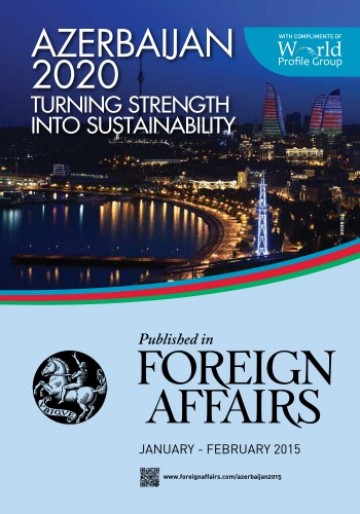News
WPG’s report “Azerbaijan 2020: Turning Strength into Sustainability” published in Foreign Affairs journal

World Profile Group has published a sponsored 12-page section on Azerbaijan in the US Foreign Affairs journal, in its January-February edition, which will also be distributed on-site at the 2015 Davos World Economic Forum.
Headlined “Azerbaijan 2020: Turning Strength into Sustainability”, the section says: “Over the past ten years Azerbaijan has been one of the fastest growing economies in the world. Rich hydrocarbon reserves and careful planning have enabled the country to build a healthy and forward-looking economy. Azerbaijan is now preparing to take the next leap.”
“A program for economic diversification and a clear vision for development are shaping the future of Azerbaijan as a globally competitive player, creating abundant opportunities for investment along the way.”
“Azerbaijan’s transformation is particularly impressive considering that twenty years ago it was mired in deep political and economic crisis. Amid post-Soviet uncertainty, the economy was in free fall, with a severe contraction in output and rampant inflation.
The revival of the country’s economy followed the introduction of a new oil strategy defined by Azerbaijan’s national leader Heydar Aliyev, which encompassed a series of production sharing agreements, and the opening of Azerbaijan’s historic oil sector to international investment. A 1994 agreement, hailed as the “contract of the century,” gave investors access to Azerbaijan’s rich oil fields in the Caspian Sea. The ensuing inflow of capital and expertise permanently altered the country’s fortunes. Large-scale production and the construction of multiple pipelines contributed to making Azerbaijan one of the world’s largest oil and gas exporters.
In June 2015, Azerbaijan will host the very first European Games—a new format of a majormulti sport event for the entire continent, created at the December 2012 General Assembly of the European Olympic Committees—in its capital city of Baku. No other European nation had exhibited quite the same level of preparedness as Azerbaijan. This will be a unique opportunity for Azerbaijan to showcase the country and to make ‘Baku 2015’ the standard for all future European Games. Azad Rahimov, Minister of Youth and Sports and CEO of the Baku 2015 European Games Operations Committee (BEGOC), notes that “it is very important for us to deliver the message to the world that Azerbaijan can achieve international sporting excellence and leave a strong legacy. Azerbaijan will deliver a firstclass event that will create positive memories and excellent facilities to inspire not only Azerbaijanis, but also future countries hosting the event.” The Baku 2015 European Games will be the largest multisport event ever to be held in Azerbaijan, even if the country has past experience in organizing large cultural events. A total of twenty sports will be represented at the Games, including sixteen Olympic sports. More than six thousand athletes from forty-nine nations are expected to take part in seventeen days of competition. The Games are being given full government support. Azerbaijan’s First Lady, Mehriban Aliyeva, chairs the organizing committee that manages the event, in cooperation with the Baku City Executive Power and the National Olympic Committee of Azerbaijan. “We now have more than 1,000 people working for the Baku 2015 European Games, and this number will eventually increase to 1,500,” says Minister Rahimov. This includes international experts who have been recruited to ensure the highest level of professionalism.”
“Azerbaijan’s strong economic development, political stability, and commitment to dialogue and cooperation are dramatically changing the country’s international standing. Regionally, on the back of its economic power, it has become a key driver for further integration. Azerbaijan accounts for roughly 80 percent of gross domestic product (GDP) of the entire South Caucasus and attracts more foreign direct investment than any other country in the region. “Azerbaijan’s geographical location and economic potential require us to be an active player in the regional integration process,” says Elmar Mammadyarov, Minister of Foreign Affairs. “Occupying a crossroad between East and West, we have a longstanding tradition of building bridges between people and societies.”
“In the wake of developing its hydrocarbon sector, Azerbaijan has established close links and economic ties with neighboring states and other countries in the region. It participates in numerous
regional organizations and encourages closer cooperation. “Azerbaijan has been behind a number of regional projects, especially in the field of energy, transport and information communication technologies,” explains Mammadyarov. “Construction of the Baku-Tbilisi-Jeyhan oil pipeline paved the
way for the completion and successful launch of the Baku-Tbilisi-Erzurum gas pipeline, as well as the Baku-Tbilisi-Kars railroad project and the TransEurasian Information Super Highway.”
Azerbaijan has played an important role in the history of oil production. It was the site of the first oil field, drilled in 1846, and of the first offshore oil field. Morethan 150 years later, Azerbaijan still stands among the world’s great oil- and gas- producing nations. Without the revenues from oil and gas production, Azerbaijan’s recent and phenomenal growth over the past two decades would have been unthinkable. “More than one hundred billion dollars in revenues have been received since the establishment of SOFAZ in 1999,” says ShahmarMovsumov, president of the State Oil Fund of Azerbaijan (SOFAZ), which is responsible for collecting and managing oil and gas revenues. “Roughly 40 percent of these revenues have been saved and 60 percent have been invested into the economy of Azerbaijan.”




